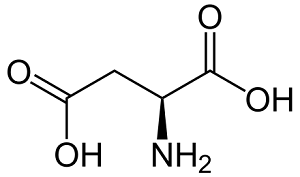L-Aspartic Acid

Product Description
L-Aspartic acid, an amino acid, plays a vital role in the biosynthesis of proteins. It is known for its importance in the body's metabolism, where it serves multiple functions.
Product:
L-Aspartic Acid
CAS:
56-84-8
Synonym:
2-Aminobutanedioic acid; Asparagic acid; Asparaginic acid
Structure:

Typical Characteristics
Appearance
White to off-white powder
Boiling point
324 °C (decomposes)
Density
1.661 g/cm3
Melting point
270-271 °C
Molecular Weight
133.10
Odor
Odorless
Purity
≥98%
Refractive index
1.4650
Uses, Applications & Markets
Key applications
Markets
get a quote
We Offer L-Aspartic Acid
in various grades
A few of the grades available are listed below:



L-Aspartic Acid used in many
industry applications
L-Aspartic acid, an amino acid, plays a vital role in the biosynthesis of proteins. It is known for its importance in the body's metabolism, where it serves multiple functions, including:
- Neurotransmitter Function: L-Aspartic acid acts as an excitatory neurotransmitter in the brain, facilitating the transmission of information between neurons. This role is crucial for maintaining healthy brain function and cognitive processes.
- Energy Production: It is involved in the Krebs cycle (also known as the citric acid cycle), a key metabolic pathway that generates energy in the form of ATP. L-Aspartic acid contributes to the production of energy, especially during strenuous activities.
- Ammonia Detoxification: L-Aspartic acid plays a significant role in the urea cycle, which is a process by which ammonia is converted into urea in the liver and then excreted in the urine. This process is vital for detoxifying ammonia, a toxic byproduct of protein metabolism.
- Synthesis of Other Amino Acids: It is a precursor in the synthesis of other amino acids, including methionine, threonine, isoleucine, and lysine in bacteria and plants. In humans, it is essential for the biosynthesis of several nucleotides that are the building blocks of DNA and RNA.
- Immune System Support: L-Aspartic acid is involved in the functioning of the immune system. It supports the production and proliferation of immune cells, enhancing the body's ability to fight off infections and diseases.
- Muscle Fatigue: Research has explored the role of L-Aspartic acid in reducing the accumulation of ammonia in the blood during prolonged exercise, potentially reducing feelings of fatigue and improving endurance performance.
- Nutritional Supplements: It is often included in nutritional supplements aimed at boosting athletic performance and recovery. Supplements containing L-Aspartic acid are popular among athletes and fitness enthusiasts for their potential to enhance energy production and reduce recovery time.
- Food Industry: In the food industry, L-Aspartic acid is used as an ingredient in certain food products. It is also a component of aspartame, an artificial sweetener.
- Medical and Therapeutic Applications: Due to its roles in neurotransmission and detoxification, L-Aspartic acid is being studied for potential therapeutic applications in neurodegenerative diseases, liver diseases, and disorders related to ammonia toxicity.